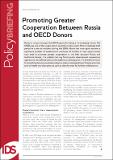| dc.contributor.author | Berenson, M. P | |
| dc.contributor.author | Larionova, M | |
| dc.contributor.author | Rakhmangulov, M | |
| dc.coverage.spatial | Russia | en_GB |
| dc.date.accessioned | 2014-03-05T15:50:51Z | |
| dc.date.available | 2014-03-05T15:50:51Z | |
| dc.date.issued | 2014-03 | |
| dc.identifier.citation | Berenson, M. P., Larionova, M. and Rakhmangulov, M. (2014) 'Promoting Greater Cooperation Between Russia and OECD Donors', IDS Policy Briefing 53, Brighton: IDS | en_GB |
| dc.identifier.uri | https://opendocs.ids.ac.uk/opendocs/handle/20.500.12413/3538 | |
| dc.description.abstract | Russia is unique amongst the BRICS group for being a ‘re-emerging’ donor. The USSR was one of the largest donor countries in the world. After a relatively brief period as a net aid recipient during the 1990s, Russia has once again become a significant provider of development assistance. A number of new opportunities now exist to promote greater cooperation in this field between Russia and traditional donors. It is unlikely that any future global development cooperation agenda can be defined without strong Russian participation. It is therefore crucial for established donor countries to develop a clear understanding of Russian priorities such as health and education, as well as identify areas for further collaboration. | en_GB |
| dc.description.sponsorship | UK Department for International Development | en_GB |
| dc.language.iso | en | en_GB |
| dc.publisher | IDS | en_GB |
| dc.relation.ispartofseries | IDS Policy Briefing;53 | |
| dc.rights.uri | http://creativecommons.org/licenses/by/3.0/ | en_GB |
| dc.subject | Development Policy | en_GB |
| dc.subject | Economic Development | en_GB |
| dc.title | Promoting Greater Cooperation Between Russia and OECD Donors | en_GB |
| dc.type | IDS Policy Briefing | en_GB |
| dc.rights.holder | IDS | en_GB |
| dc.identifier.ag | OT/11009/5/1/2/145 | |


